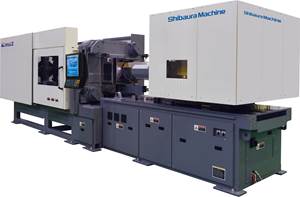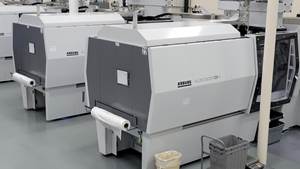Rigid Packaging Goes Lighter, Thinner With Microcellular Foam
Molding higher volumes of a rigid thin-wall part typically means going to a larger press for increased injection and clamping capacity.
Molding higher volumes of a rigid thin-wall part typically means going to a larger press for increased injection and clamping capacity. But one of Europe’s leading packaging producers is accomplishing this feat on smaller presses by taking thin-wall rigid packaging to new lows of lightweighting.
Autobar Packaging Group in Lyon, France, developed Super Light Injection Molding (SLIM), a thin-wall molding concept that for the first time applies the MuCell microcellular foaming process to a packaging application. Autobar combines SLIM with extra-thin, five-sided in-mold labels (IML) that it also developed.
Autobar is a $508-million/yr packaging molder with three divisions (rigid, flexible, and international) operating 15 plants with 2200 employees in seven European countries.
At the rigid packaging plant in Ravensburg, Germany, a directive to increase output of its core product prompted a revolutionary process development, says Eric Chavent, group commercial director at Ravensburg. The main product there is a 150-mm, 500-g PP margarine tub produced in 4+4 stack molds on 550-ton presses. It is the company’s highest-volume rigid packaging item. “We wanted to transfer molding of this part to 385-ton presses for cost savings,” says Thierry Bernet, managing director.
Autobar has 385-ton and 550-ton Netstal injection presses at the plant. A group of 550-ton presses makes 150 million of these 500-g containers a year at the plant and Autobar is looking to raise output to 200 million units annually without buying new machines. Lightweighting the container with SLIM was pivotal to achieving its goals.
Thinner, lighter
The key to SLIM is the MuCell process from Trexel Inc., Woburn, Mass., in which a non-flammable gas is heated and pressurized to a supercritical state so that it behaves like a fluid. Then it is blended with molten resin and injected into the mold. MuCell reportedly can reduce melt viscosity up to 60%, pare process temperatures up to 140° F, decrease molding pressures by 50%, cut clamp-tonnage requirements up to 75%, and reduce or eliminate the need for hold time and hold pressure.
Autobar conducted tests of its SLIM process on a 550-ton press and saw immediate results. Clamp-force and injection-pressure requirements dropped by 15%, to well within the capacity range of a 385-ton press, says Bernet.
Without MuCell, the molded tub weighed 15.21 g and parts exhibited a standard deviation of 0.33 g. With MuCell, part weight dropped 6.5% to 14.23 g and the standard deviation shrank to 0.17 g. MuCell also allowed trimming the wall thickness by 0.4 mm while reducing the chance for sink marks or short shots. “Top-load strength was lowered 15% with the use of MuCell, but it still met performance requirements,” says Bernet.
Autobar developed the 38-micron, five-layer extruded PP label for the tubs at its AFDP facility in Angouleme, France, in collaboration with film supplier Treofan, based in Raunheim, Germany. Typical in-mold labels are 75 microns thick, although some savvy molders are handling 50-micron labels. “Such thin labels enable us to get perfect sealing with lower temperature and injection pressure,” says Bernet.
Autobar will begin molding the thinner tubs on 15 SLIM-ready presses equipped with an IML automation system from Machines Pages SA of Foncine Le Haut, France; label static-charging bars from Simco Co. Industrial Static Control, Hatfield, Pa.; and two-face stack tools from Plastisud SA of Castelnaudary, France. A nitrogen generator from Trexel will service all the MuCell-ready machines.
Related Content
Completely Connected Molding
NPE2024: Medical, inmold labeling, core-back molding and Industry 4.0 technologies on display at Shibaura’s booth.
Read MoreHaitian Develops Special Edition JU, MA Series for Increased Energy Savings
These models are designed to enable molders to select the right performance level for their needs with the same energy savings but at a lower cost.
Read MoreConsistent Shots for Consistent Shots
An integral supplier in the effort to fast-track COVID-19 vaccine deployment, Retractable Technologies turned to Arburg and its PressurePilot technology to help deliver more than 500 million syringes during the pandemic.
Read MoreArburg Open House Emphasizes Turnkey Capabilities
Held at the company’s U.S. headquarters in Rocky Hill, Connecticut, the event featured seven exhibits, including systems that were designed, sourced and built in the U.S.
Read MoreRead Next
Lead the Conversation, Change the Conversation
Coverage of single-use plastics can be both misleading and demoralizing. Here are 10 tips for changing the perception of the plastics industry at your company and in your community.
Read MorePeople 4.0 – How to Get Buy-In from Your Staff for Industry 4.0 Systems
Implementing a production monitoring system as the foundation of a ‘smart factory’ is about integrating people with new technology as much as it is about integrating machines and computers. Here are tips from a company that has gone through the process.
Read MoreFor PLASTICS' CEO Seaholm, NPE to Shine Light on Sustainability Successes
With advocacy, communication and sustainability as three main pillars, Seaholm leads a trade association to NPE that ‘is more active today than we have ever been.’
Read More











